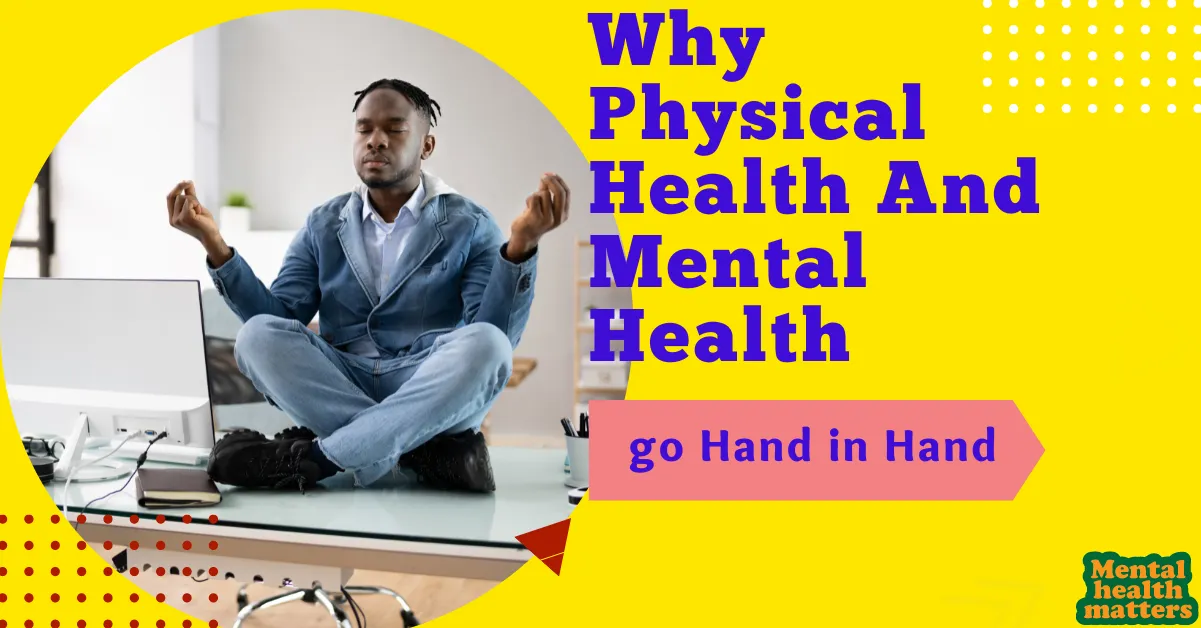Understanding the connection between physical and mental health is essential because they go hand in hand.
Are you concerned about the effect of stress on your body? Do you worry about your mental well-being? If yes, then you must read this post. In it, we discuss the effects of both physical and mental illness. Mental illness refers to our emotional status.
Physical illness means our general physical conditions. Both these factors affect our lives significantly. Both physical and mental illnesses can cause severe problems for an individual. But if treated early enough, they can lead to complete recovery.
As technology continues to take up more space in our daily routines, we’re becoming increasingly stressed out and depressed. A recent study by the University of Göttingen, Germany, found that the more frequently we used laptops and smartphones, the worse off we were physically and mentally.
We must understand the connection between mental and physical health, from the biological to the social. However, what is most important is that we take action to improve our overall well-being. Therefore, it is essential that we actively seek out ways to improve our physical health. One of the best things we could do for ourselves is engage in regular physical activity.
The Connection Between Physical and Mental Health
It has been shown that regular physical activity decreases anxiety and depression, improves symptoms of low self-confidence and social isolation, and increases blood flow to the brain. This helps improve communication between the hypothalamic-pituitary-adrenal (HPA) system and the parts of the brain that control mood and behavior.
What Happens Inside Our Brain When We Exercise
When we begin exercising, our brain perceives it as a stressful event, causing it to produce a chemical called BDNF (Brain-Derived Neurotrophic Factor), which helps our brain cells grow stronger and protects them from damage. At the same time, our brain produces an enzyme called Endorphin, which counteracts the feeling of pain and increases our mood.
Your body produces endorphins after a workout, which makes you feel good. These endorphins help you cope with stress better.
Exercise And Psychotherapy
Mental illness affects millions of people around the world each year, and although there are various treatments available, many people do not get the care they need.
People who suffer from mental illnesses are less likely to receive regular checkups to ensure that they stay healthy. They are also less likely to be offered help improving their lifestyle habits, such as reducing drinking or changing their diets.
However, both physical and mental aspects of our lives are equally important, so if you’re concerned about someone’s mental state, take steps to address their physical well-being, too.
Prioritizing Physical Activity
Studies have shown that physical activity offers both physical and mental benefits. It improves our health by releasing feel-good chemicals into the body, which helps us relax and reduces stress levels. Research indicates that regular physical activity increases our self-esteem and sense of happiness.
5 Reasons Why Physical and Mental Health Go Hand in Hand
The connection between physical and mental health is deeply intertwined. Scientific research increasingly shows that consistent physical activity significantly enhances emotional well-being, cognitive function, and quality of life. Below are five compelling reasons why physical health and mental health are inseparable.
| Reason | Explanation |
|---|---|
| 1. Exercise Helps Manage Stress | Physical activity reduces cortisol—the body's primary stress hormone. High cortisol is linked to anxiety and depression. Engaging in simple routines like walking, yoga, or jogging can drastically improve mood and reduce stress. A 30-minute walk, for instance, has been proven to lower anxiety levels and enhance overall mental health. |
| 2. Cardiovascular Fitness Boosts Brain Power | Cardiovascular exercises like cycling, swimming, and running stimulate neurogenesis (the growth of new neurons) in the hippocampus, the brain’s memory center. Strength training and weightlifting also enhance self-esteem and cognitive clarity—reinforcing how physical health and mental health improve together. |
| 3. Protection Against Neurodegenerative Diseases | Starting physical activity as early as your 20s can lead to better brain health in later years. Exercise increases neurotrophic factors, essential proteins that keep neurons healthy and delay the onset of conditions like Alzheimer’s. These benefits highlight the long-term synergy of physical and mental health. |
| 4. Prevention of Cognitive Decline | Consistent exercise supports memory retention, learning, and focus. Activities such as sprinting or interval training have been linked to enhanced vocabulary acquisition and mental agility. This ongoing stimulation maintains brain sharpness and prevents age-related mental decline. |
| 5. Better Sleep and Deep Relaxation | Quality sleep is fundamental to mental health. Regular physical activity helps regulate circadian rhythms, alleviates insomnia, and increases relaxation. Improved sleep further enhances emotional resilience and reduces symptoms of anxiety and depression—proving once again that physical health and mental health are strongly connected. |
In conclusion, investing in your fitness isn't just about physical appearance—it's a profound commitment to your emotional and cognitive well-being. A balanced routine that nurtures both physical and mental health can empower you to live a longer, more fulfilling life.
The Holistic Impact of Fitness on Mental Health
In addition to these five key reasons, it’s essential to consider the holistic impact of fitness on mental health. Regular physical activity fosters a sense of accomplishment and boosts self-esteem.
When individuals set and achieve fitness goals, they experience a sense of purpose and empowerment, which can positively affect their mental well-being.
Moreover, exercise releases endorphins, often called “feel-good” hormones, which naturally elevate mood and reduce pain perception.
Practical Tips for Integrating Exercise into Daily Life
To reap the mental health benefits of exercise, it’s crucial to integrate physical activity into your daily routine. Here are some practical tips to help you get started:
-
Set Realistic Goals: Begin with achievable fitness goals that match your current fitness level. Gradually increase the intensity and duration of your workouts.
-
Choose Enjoyable Activities: Choose exercises like dancing, hiking, or playing a sport. Enjoyable activities are more likely to become regular habits.
-
Create a Schedule: Allocate specific times for exercise in your daily routine. Consistency is vital to experiencing the long-term benefits of physical activity.
-
Incorporate Social Elements: Exercise with friends or join a fitness class. Social interactions during physical activity can enhance motivation and make workouts more enjoyable.
-
Listen to Your Body: Pay attention to your body’s signals and avoid overexertion. Rest and recovery are essential components of a successful fitness regimen.
Conclusion
Fitness and mental health are deeply interconnected, with regular physical activity offering numerous psychological benefits. From reducing stress and anxiety to enhancing cognitive function and preventing degenerative diseases, exercise plays a vital role in maintaining and improving mental health. By incorporating regular physical activity into your lifestyle, you can enjoy a healthier, happier, and more balanced life.
Focusing on these aspects, we can better understand and appreciate fitness’s profound impact on mental health, motivating more individuals to adopt an active and healthy lifestyle.
Source & Credits:
Body & Mind: The Powerful Connection Between Physical and Mental Health
https://www.femalefirst.co.uk/health/seven-reasons-why-fitness-and-mental-health-go-hand-in-hand-1229069.html
https://medium.com/live-your-life-on-purpose/how-mental-health-and-physical-health-go-hand-in-hand-can-help-you-live-a-better-life-383022b8444


I suggest to you the title “How Fitness and Mental Health Fuel Each Other for Optimal Well-being”
I’ve definitely noticed a correlation between my mental health and physical well-being. When I’m feeling stressed or anxious, it’s harder to take care of my body.
This is such an important reminder! My fitness journey totally transformed my mental health. If you’ve been on the fence, definitely check out this link – it’s a game-changer.
Couldn’t agree more! Fitness isn’t just about physical gains, it’s a powerful tool for managing stress and anxiety. Thanks for sharing this valuable resource! What’s one positive change fitness brought to your mental well-being?